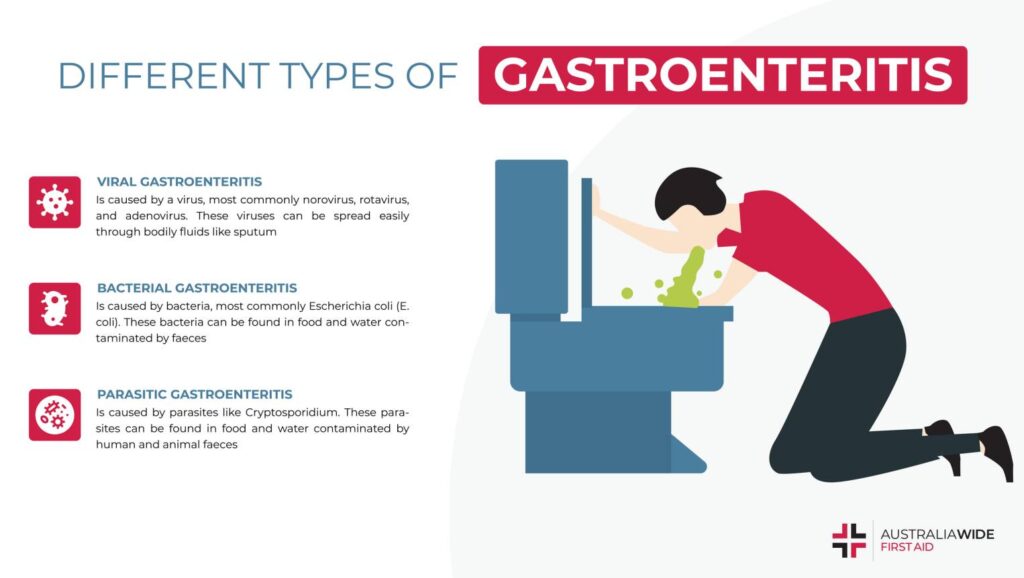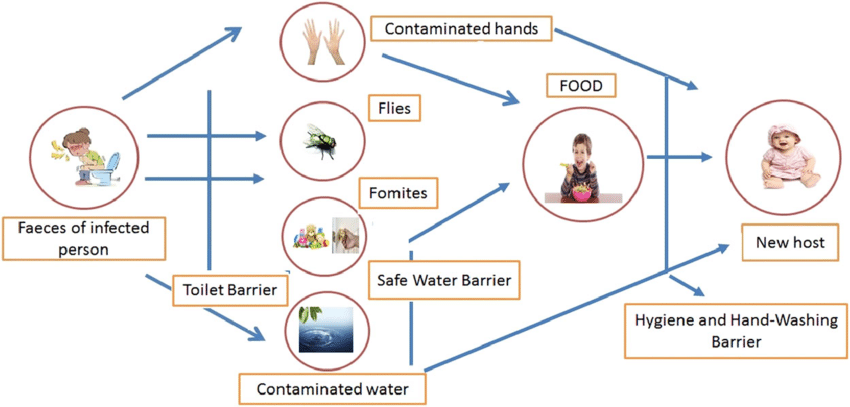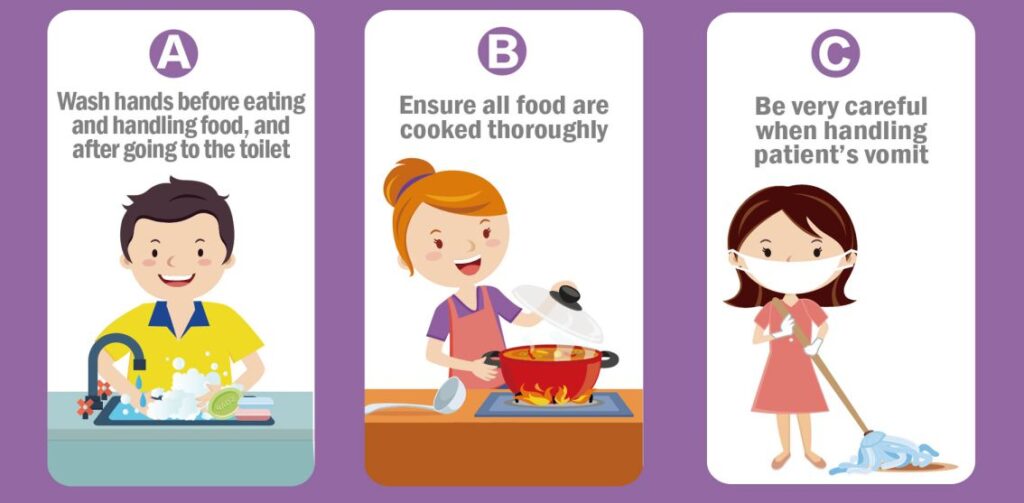Table of Contents
ToggleGastroenteritis (GE)
Gastroenteritis is a medical condition characterized by inflammation of the gastrointestinal tract that involves both the stomach (“gastro“-) and the small intestine (“entero“-), resulting in some combination of diarrhea, vomiting, and abdominal pain and cramping.
The severity of infectious gastroenteritis depends on the immune system’s ability to resist the infection.
Electrolytes (mainly sodium and potassium) may be lost as the infected individual vomits and experiences diarrhea.

Causes of Gastroenteritis
- Viruses
- Rotavirus, norovirus, adenovirus, and astrovirus are known to cause viral gastroenteritis.
- Rotavirus is the most common cause of gastroenteritis in children.
- Norovirus is the leading cause of gastroenteritis among adults, causing greater than 90% of outbreaks.
- Bacteria
- In the developed world Campylobacter jejuni is the primary cause of bacterial GE.
- Escherichia coli
- Salmonella, Shigella, and Campylobacter species.
- Salmonella is contracted by ingesting the bacteria in contaminated food or water and by handling poultry.
- Campylobacter occurs by the consumption of raw or undercooked poultry meat and other foods. It is also associated with unpasteurized milk or contaminated water.
- Clostridium difficile is an important cause of diarrhea that occurs more often in the elderly. It is a common cause of diarrhea in those who are hospitalized and is frequently associated with antibiotic use.
- Staphylococcus aureus infectious diarrhea may also occur in those who have used antibiotics.
- Parasites
A number of protozoans can cause gastroenteritis – most commonly: – Giardia lamblia
- – Entamoeba histolytica
- – Cryptosporidium
- Non-infectious causes
- – Medications like NSAIDs
- – Certain foods such as lactose (in those who are intolerant).
- – Crohn’s disease.

Transmission:
The transmission of germs occurs through the feces or vomit of individuals infected with the illness. Gastroenteritis can be spread through the following means:
- Consuming untreated or unboiled water from rivers, streams, lakes, ponds, or unprotected springs.
- Eating cold food that has been exposed to dust, flies, or cockroaches.
- Neglecting to wash hands with soap and water after using a latrine.
- Eating unwashed fruits and vegetables.
- Serving food and drinks in dirty containers.
- Storing drinking water in unclean containers.
- Improper disposal of feces.
- Presence of open rubbish in areas that attract flies and cockroaches.
Signs and Symptoms:
The primary symptom is diarrhea, often accompanied by vomiting. Infected individuals may notice the presence of blood or mucus in their stools. Crampy abdominal pain is a common occurrence, which may temporarily ease after passing stool. There may be a low-grade fever, headache, and body aches. Symptoms of dehydration may include:
- Muscular cramps, sunken eyes, decreased urine output, dry mouth and tongue, weakness, and irritability. In severe cases, adults may experience symptoms such as fatigue, dizziness or lightheadedness, headache, weakness, confusion, rapid heart rate, coma, and significantly reduced urine production.
Diagnosis:
- Gastroenteritis is diagnosed clinically, based on a person’s signs and symptoms.
- Stool cultures should be performed especially in those with blood in the stool.
Management:
- Gastroenteritis is usually an acute and self-limiting disease that does not require medication.
- The preferred treatment in those with mild to moderate dehydration is oral rehydration therapy (ORT).
- Intravenous delivery may be required if there is a decreased level of consciousness or if dehydration is severe.
- Plain water may be used if more specific and effective ORT preparations are unavailable or not palatable.
- A nasogastric tube can be used in young children to administer fluids if necessary.
- Institute a fluid balance chart.
- Metoclopramide may be helpful in some children, and butylscopolamine is useful in treating abdominal pain.
- Fermented milk products (such as yogurt) are similarly beneficial.
- Zinc supplementation is effective in both treating and preventing diarrhea among children.
- Antibiotics are not usually used for gastroenteritis, although they are sometimes recommended if symptoms are particularly severe or if a susceptible bacterial cause is isolated or suspected.
- If antibiotics are to be employed, a macrolide (such as azithromycin) is preferred. Metronidazole or Tinidazole is used if the cause is protozoa.
- Isolation of the patient to prevent cross-infection.
- Proper disinfection and disposal of stool and vomit.

Prevention and Control:
- Always wash hands with water and soap before preparing, serving, or eating food.
- Always wash hands with soap and water after using a latrine.
- Boil all drinking water or treat it with chlorine. Store it in a clean container.
- Consume food while it is still hot.
- Ensure that raw foods such as fruits and vegetables are properly washed and, whenever possible, peeled before eating.
- Cover all foods to prevent contamination by dust, house flies, and cockroaches.
- In the event of a person’s death due to diarrhea, report it immediately to the health authorities.
- Kill germs by using germ-killing solutions like JIK (bleach) on stool or vomit and on all other materials used by the person suffering from diarrhea.
- Improve water and sanitation to reduce the transmission of infection.
- Conduct investigations of diarrheal outbreaks.
- Treat other infections such as typhoid, dysentery, etc.
- Address and treat malnutrition.
- Consider immunization with Rota vaccine, which provides protection against rotavirus, a common cause of gastroenteritis.


Thank you
The session has been very helpful,,
Some questions to guide would be more beneficial
Greatful
Thank you very much.It is worthwhile.
May you please help me and also share the pathophysiology and the Specific Nursing management?